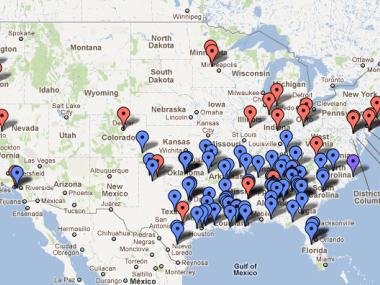How Do You Use the Word ‘Commiserate?’
One of our listeners called in recently to ask about the word “commiserate.”
“Hi Mignon. This is Kate from Colorado, and my friend Anna from Louisiana and I were discussing the word ‘commiserate’ the other day, and we had both used it in the context of really experiencing the same situation or feeling the pain of somebody that expressed a difficult situation. So if you were commiserating about work it was that we were sharing in that sorrow or difficulty together. But we also recognize that the dictionary definition simply says to sympathize or to empathize or have pity, and that gives the impression of being outside of the situation and expressing sympathy or sorrow for what they’re experiencing. So are we using it incorrectly, and is there a different word that we should be using? Because you could simply say, ‘Oh, I relate to you,’ but that doesn’t have the same kind connotation. For me, ‘commiserate’ has always had that connotation of sharing it with that person, and I think that he’s in the context of like, ‘Oh yeah we sat, we drink beer, and commiserated about the week,’ but I don’t know that we’re using it correctly, so I would love to hear your input on that. Thanks so much. Love the show. Bye.”
Thanks for the question, Kate. So do you commiserate about an experience? Do you commiserate someone? Do you commiserate with someone?
The answer is all of the above.
Let’s start at the beginning.
“Commiserate” means to feel pity or compassion about another person’s misfortune. It comes from the Latin “commiserati,” meaning “to pity or bewail.” That word in turn is a mashup of “com,” meaning “together or in combination,” and “miser,” meaning “unhappy, wretched, or in distress.”
Other words that come from this root include “miserable,” meaning “wretchedly unhappy,” and “misery,” meaning “a state of great sorrow, misfortune, or distress.”
Interestingly enough, another related word is “miser,” meaning a covetous person who hoards their money. This meaning seems to rely on a belief that pinching pennies and refusing to share your wealth will lead to unhappiness.
Charles Dickens’ Ebeneezer Scrooge is a fictional example of this belief. A real-life example is Hetty Green, a 19th-century American financier known as “the witch of Wall Street.” Although Green was a multi-millionaire, she wore ragged clothes, went to charity clinics instead of regular doctors, and supposedly refused to treat her son’s leg when it was injured, leading to its eventual amputation.
I think we can guess that Hetty was, indeed, pretty unhappy.
But back to our original question: how do we properly use the word “commiserate?” There are a few options:
- We can use it as a transitive verb, meaning “to bemoan or lament,” as in “I commiserate the state of your bedroom … it looks like you haven’t cleaned it in months!”
- We can use it to mean that we’re expressing sympathy for someone, as in “I commiserate the rest of your family for having to deal with your disgusting bedroom.”
Both of these usages are valid, but they’re somewhat rare. Today, it’s more common to hear “commiserate” used these two ways:
- We can use it as an intransitive verb, meaning “to sympathize with another person or to share a common complaint.” For example, “The two teenagers commiserated about how often their parents nag them to clean.” Or, “The parents met for coffee to commiserate about their messy children.
- We can also use it to mean that we’re sympathizing with another person. For example, “The middle schoolers hid in the treehouse and commiserated with each other about the argument taking place between their parents and their siblings. The dogs commiserated with the parents, snuggling up to them on the couch as if to say, ‘We understand how you feel.’”
Saying that you commiserate with someone is the most common way the word is used today. So you aren’t using it incorrectly, Kate! You’re using it in one of the more common ways, it’s just that there are other ways to use it too. Thanks for asking.
Until our next podcast, please know that I commiserate with all of your grammar frustration and will do my best to help.
Image courtesy of Shutterstock.
Resources
Encyclopedia Britannica, Hetty Green. Accessed January 28, 2022.
Merriam-Webster’s Dictionary, commiserate, accessed January 28, 2022.
Online Etymology Dictionary, commiserate. Available by subscription only, accessed January 28, 2022.
Oxford English Dictionary Online, commiserate. Available by subscription only, accessed January 28, 2022.





